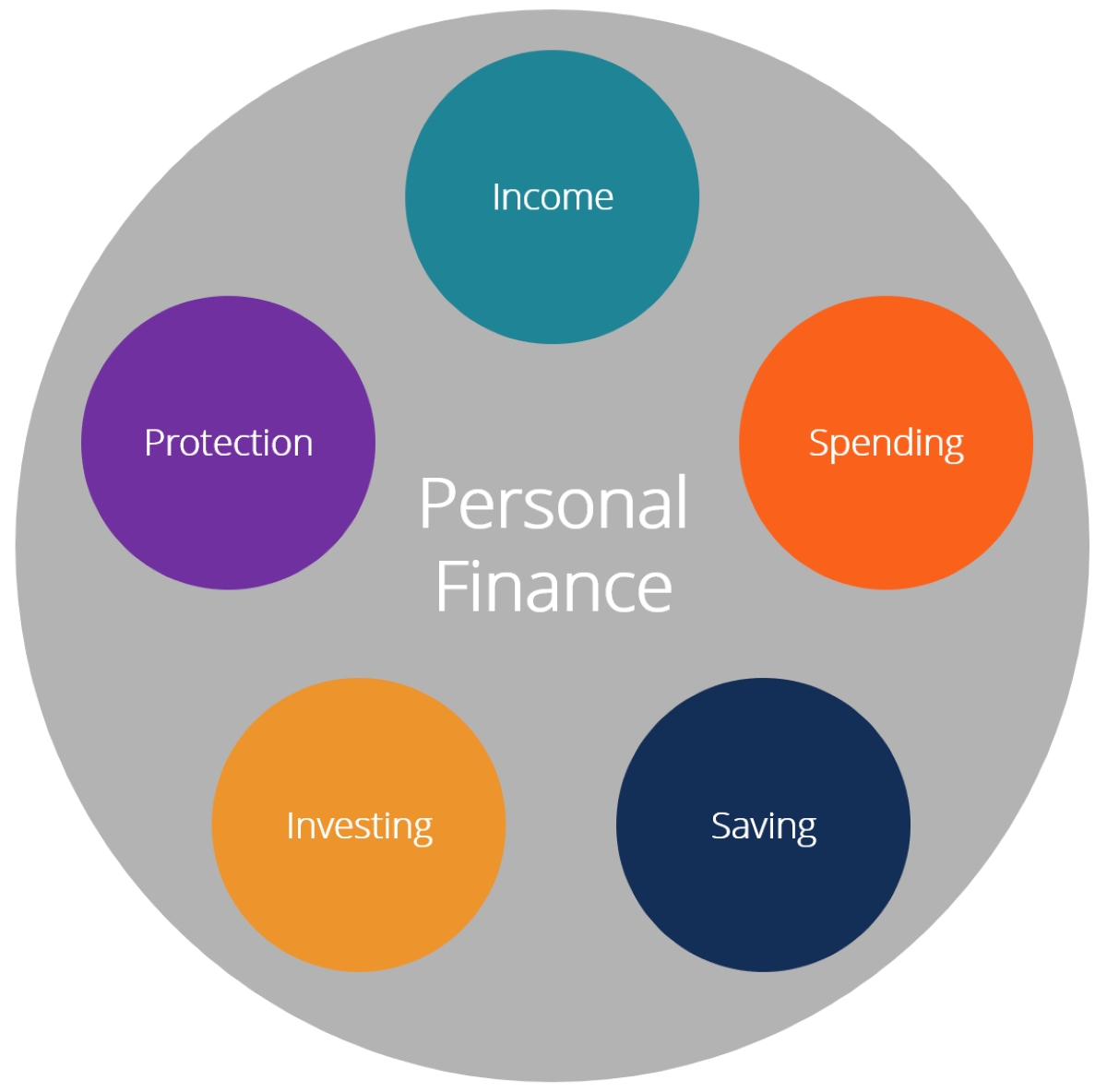Home>Finance>What Are The Five Foundations Of Personal Finance?


Finance
What Are The Five Foundations Of Personal Finance?
Published: January 22, 2024
Learn the five essential foundations of personal finance to achieve financial stability and success. Discover key principles and strategies for managing your finances effectively.
(Many of the links in this article redirect to a specific reviewed product. Your purchase of these products through affiliate links helps to generate commission for LiveWell, at no extra cost. Learn more)
Table of Contents
Introduction
Understanding the Five Foundations of Personal Finance
Personal finance is a critical aspect of everyone's life, yet many individuals find themselves navigating its complexities without a clear roadmap. In today's fast-paced world, where financial decisions have far-reaching implications, it's essential to establish a strong foundation for managing personal finances. The five key pillars of personal finance serve as the cornerstones for achieving financial stability, security, and prosperity. By comprehensively understanding and effectively implementing these foundations, individuals can gain control over their finances and work towards their long-term goals.
The five foundations of personal finance encompass budgeting, saving, investing, managing debt, and risk management. Each pillar plays a vital role in shaping an individual's financial well-being, and they are interconnected, working in harmony to build a solid financial future. Throughout this article, we will delve into each foundation, exploring its significance and practical strategies for implementation. Whether you're a recent graduate, a seasoned professional, or someone looking to enhance their financial literacy, mastering these foundations is pivotal for achieving financial success. Let's embark on a journey to unravel the intricacies of personal finance and equip ourselves with the knowledge and tools to make sound financial decisions.
Budgeting: The Bedrock of Financial Stability
Budgeting serves as the cornerstone of personal finance, providing a roadmap for managing income, expenses, and savings. It empowers individuals to allocate resources efficiently, prioritize financial goals, and track their spending patterns. A well-crafted budget not only fosters financial discipline but also instills a sense of control and awareness regarding one’s financial standing.
Creating a budget begins with assessing all sources of income and categorizing expenses into essential and discretionary items. This delineation enables individuals to distinguish between necessities, such as housing, utilities, and groceries, and non-essential expenditures, including dining out and entertainment. By establishing clear spending limits for each category, individuals can curb impulsive spending and direct their resources towards their financial objectives.
Moreover, budgeting facilitates the cultivation of a savings habit. By earmarking a portion of income for savings and emergency funds, individuals fortify their financial resilience, ensuring they are prepared for unforeseen expenses or economic downturns. Additionally, a well-structured budget allows for the allocation of funds towards debt repayment, thereby aiding in the reduction of interest payments and eventual debt elimination.
Embracing technology can significantly enhance the budgeting process, with various apps and software offering tools for expense tracking, goal setting, and financial analysis. These digital resources streamline the budgeting process and provide real-time insights into one’s financial health, empowering individuals to make informed decisions.
Ultimately, budgeting is not merely a financial exercise but a mindset that fosters prudence, discipline, and foresight. It lays the groundwork for sound financial management, enabling individuals to live within their means, save for the future, and navigate financial challenges with confidence.
Saving: Building a Financial Safety Net
Saving is a fundamental pillar of personal finance, serving as a means to build a financial safety net, achieve financial goals, and secure one’s future. It involves setting aside a portion of income for future use, thereby cultivating a habit of prudence and foresight. Saving not only provides a cushion for unexpected expenses but also facilitates progress towards significant milestones, such as homeownership, education, or retirement.
One of the primary vehicles for saving is the establishment of an emergency fund. This fund, typically equivalent to three to six months’ worth of living expenses, acts as a financial buffer during unforeseen circumstances, such as medical emergencies, job loss, or major home repairs. By prioritizing the accumulation of an emergency fund, individuals mitigate the impact of financial shocks and avoid falling into debt due to unexpected events.
Furthermore, saving paves the way for achieving long-term financial aspirations. Whether it’s purchasing a home, funding higher education, or retiring comfortably, disciplined saving is integral to realizing these objectives. By diligently setting aside funds and leveraging the power of compounding, individuals can steadily progress towards their desired milestones, ensuring financial stability and peace of mind.
Automating the saving process can be a powerful strategy, as it removes the temptation to spend the allocated funds and reinforces consistent saving habits. Setting up automatic transfers from a checking account to a designated savings or investment account streamlines the saving process, making it a seamless and integral part of one’s financial routine.
Ultimately, saving is not solely about accumulating money; it embodies a mindset of prudence, preparedness, and future-oriented thinking. By embracing the discipline of saving, individuals lay the groundwork for financial security, enabling them to weather unexpected challenges and pursue their aspirations with confidence.
Investing: Growing Wealth and Securing the Future
Investing is a pivotal component of personal finance, offering a pathway to grow wealth, generate passive income, and secure a prosperous future. It involves deploying funds into various financial instruments with the aim of earning returns that outpace inflation, thereby increasing the purchasing power of capital over time.
One of the fundamental principles of investing is diversification, which entails spreading investments across different asset classes, such as stocks, bonds, real estate, and commodities. Diversification mitigates risk by reducing the impact of volatility in any single investment, thereby safeguarding the overall portfolio from significant fluctuations.
Furthermore, investing fosters the power of compounding, wherein returns generated from investments are reinvested to generate additional earnings. Over time, compounding accelerates wealth accumulation, as the initial investment, along with its accrued returns, continues to grow exponentially.
For individuals seeking to invest, it is essential to align investment strategies with their risk tolerance, financial goals, and time horizon. Long-term investments, such as retirement accounts and equity holdings, are suited for individuals with extended time horizons, allowing for the weathering of market fluctuations and the realization of substantial growth over time.
Moreover, embracing a disciplined approach to investing, characterized by consistent contributions and periodic portfolio rebalancing, ensures that individuals remain aligned with their financial objectives and risk tolerance. Regularly reviewing and adjusting investment allocations in response to changing market conditions and life events is crucial for maintaining a balanced and resilient investment portfolio.
Ultimately, investing is not solely about generating wealth; it embodies a strategic approach to securing financial independence and realizing long-term aspirations. By harnessing the potential of investing, individuals can fortify their financial future, create opportunities for wealth accumulation, and pave the way for a prosperous and fulfilling life.
Managing Debt: Navigating Towards Financial Freedom
Debt management is a critical aspect of personal finance, influencing individuals’ financial well-being and shaping their ability to achieve long-term goals. While debt can serve as a tool for accessing essential assets, such as homes and education, effective management is essential to prevent it from becoming a burden that impedes financial progress.
One of the primary strategies for managing debt is to prioritize high-interest debt repayment, such as credit card balances and personal loans. By directing surplus funds towards eliminating high-interest debt, individuals can reduce interest payments and expedite their journey towards debt freedom.
Consolidating high-interest debts through methods such as balance transfers or debt consolidation loans can also be an effective approach to streamline debt repayment. This consolidation can lower overall interest costs and simplify the repayment process by combining multiple debts into a single, manageable payment.
Moreover, adopting a proactive stance towards debt management involves creating a realistic repayment plan and adhering to a structured budget that allocates funds towards debt reduction. This approach not only accelerates debt repayment but also instills financial discipline, ensuring that individuals remain focused on their long-term financial well-being.
Furthermore, prudent use of credit and the avoidance of unnecessary debt are integral to effective debt management. By exercising restraint in borrowing and maintaining a healthy credit utilization ratio, individuals can safeguard their financial stability and creditworthiness, setting the stage for future financial opportunities.
Ultimately, managing debt is not solely about repaying what is owed; it embodies a mindset of financial responsibility and empowerment. By adopting proactive debt management strategies, individuals can liberate themselves from financial burdens, pave the way for future prosperity, and embark on a journey towards lasting financial freedom.
Risk Management: Safeguarding Financial Well-being
Risk management is an integral facet of personal finance, encompassing strategies aimed at mitigating potential financial setbacks and protecting one’s assets and income. By proactively identifying and addressing risks, individuals can fortify their financial well-being and navigate unforeseen circumstances with resilience and confidence.
One of the fundamental components of risk management is the acquisition of insurance coverage to protect against various contingencies. This includes health insurance to mitigate the financial impact of medical expenses, property insurance to safeguard against damage or loss of assets, and life insurance to provide financial security for loved ones in the event of unforeseen circumstances.
Furthermore, establishing an emergency fund serves as a crucial risk management tool, providing a financial buffer to address unexpected expenses or income disruptions. By maintaining a readily accessible pool of funds, individuals can mitigate the impact of unforeseen events, such as job loss or medical emergencies, without resorting to high-interest debt or depleting long-term savings.
Additionally, prudent estate planning and the establishment of legal safeguards, such as wills and trusts, are essential components of risk management. These measures ensure that individuals’ assets are protected and distributed according to their wishes, providing peace of mind and financial security for their beneficiaries.
Moreover, diversification of investments and the cultivation of a balanced portfolio serve as risk management strategies within the realm of investing. By spreading investments across different asset classes and geographic regions, individuals can mitigate the impact of market volatility and specific economic risks, thereby safeguarding their long-term financial objectives.
Ultimately, risk management is not solely about preparing for worst-case scenarios; it embodies a proactive approach to safeguarding financial well-being and fostering peace of mind. By implementing comprehensive risk management strategies, individuals can navigate life’s uncertainties with resilience, protect their financial assets, and lay the groundwork for a secure and prosperous future.














